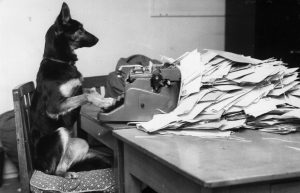BLUE CITY
Spoiler Alert

THE END OF THE ENDING
Since Blue City is as much a novel about social and political reform as it is a mystery, the reveal of the murderer isn’t the end of the story. Now that Weather has inherited the position and wealth of his father, what will he do? The comparisons with Hamlet take the reader a long way, but they are no use any further.
What happens
Macdonald has two plots to resolve, the primary one about Allister and the secondary romantic plot with Carla. He brings them together in a way that shows real talent:
- After Allister has completed his confession, Weather leaves Allister to be watched by Francie while he goes to the phone to call the only police officer he trusts, Inspector Hanson. You may recall that Macdonald left Hanson at the hospital, at Carla’s bedside, while Weather went to Francie’s apartment.
- After telling Hanson about Allister’s confession, Weather asks about Carla. Hanson says she is doing well and soon can be moved to a semi-private room.
- Weather insists that she be moved to a private room; and when Hanson says that he must be a relative to make that kind of decision, he tells Hanson that he is going to marry her.
- As he hangs up, Francie shoots Allister (a result that we saw coming ten pages ago).
With Allister’s death, the romantic subplot and the political questions remain. His reflections in the immediate aftermath of Allister’s death deserve to be quoted, at least in part. Any summarization is going to change Macdonald’s meaning:
“It was an ugly city, too ugly for a girl like Carla . . . . If Carla and I wanted to make anything of each other—and that would be hard enough—we’d have to get away from this city. When her shoulder healed, I knew she’d be ready to go.
“But the I couldn’t sure I would be ready. I had a chance to stay and stick in the monster’s crop. I was hardly the man for the job, and I couldn’t do it alone, and you couldn’t build a City of God in the U.S.A. in 1946. But something better could be made . . . A city could be built for people to live in. Before I decided to leave the city, or stay, I’d have to look for the good men who lived here . . .”
So, what do we make of this?
Carla had disclosed her plans to go to Chicago as soon as she could. Being shot and nearly killed gives her an additional reason to be gone. Johnny recognizes that Carla not only wants to go, but needs to go. Their happiness as a couple depends on the two of them leaving.
Macdonald presents it as an either/or, and I think he is right. Building a life as Weather’s wife in a city where she was known as a sex worker is not going to work. Weather has to decide if staying is worth the price he will have to pay.
Macdonald gave us an ambiguous ending to the romance in The Dark Tunnel, but that one was easy. The sort-of engagement in The Dark Tunnel involved a brief conversation followed by eight years of no contact. At the end of The Dark Tunnel, the protagonist’s fiancée was little more than a plot device. In the relationship between Weather and Carla in Blue City, Macdonald is playing with live ammunition. Macdonald had the strength not to yield to the temptation to make it an unabashedly happy ending. He cannot ignore how the city taints and complicates everything, even Johnny Weather. We are left to puzzle it out for ourselves.
A trade secret and an undocumented speculation
First, the secret.
Writers fiddle with the ending more than any other part.
Why? Because we don’t know what kind of a book we’ve written till it’s done; and what we produce is never exactly what we first set out to write. Hopefully it’s better, but it will always be different. And by far the easiest place to do a certain kind of fine tuning is in the last couple of pages. Writers are many bad things, but we are not stupid. We understand the principals of primacy and recency. The last words of the book leave an impression out of proportion to their length.
The undocumented speculation
The last two pages have a different tone than the rest of the book. What has changed is Weather’s ability to be thoughtful, even introspective. A blood and thunder ending would have been more congruent with the rest of the book. Actually, nothing further was necessary after Allister’s confession. We didn’t need the phone call to the police. The action was concluded with the death of Allister. I think that this was probably the original ending; and if not, something equally unsubtle and violent. And I think that Macdonald had the eye to see that it didn’t work, that the story deserved more.
If he had only had the time to rework the rest of the book the same way . . .
Comments? Email me at dgarrett1948@ptd.net
Recent Comments